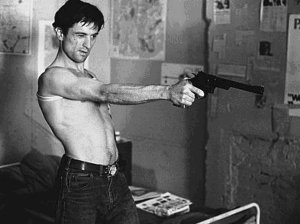Taxi Driver
He’s a lonely forgotten man desperate to prove that he’s alive.

|
One of Scorsese’s most acclaimed directorial successes, Taxi Driver is the brilliant, disturbing and unromanticised portrayal of an antihero. Travis Bickle (Robert De Niro) is a discharged U.S. marine living on his own in New York City, who decides to take up a job as taxi driver to make a profit out of his insomnia. The film opens with a shot of Bickle’s infamous taxi passing through a dim cloud of smoke, with the intense drums of the soundtrack and the dark tint evoking an almost hell-like image. We are then taken on a ride through a rainy, blurry New York made of neon lights and ghostly presences, as if exploring it within a lucid dream. Both sequences impeccably set the gloomy tone of the whole feature. For the rest of the film we follow Travis on his daily life as he observes the decay of his city after the Vietnam War and attempts to pursue Betsy (Cybill Shepherd), a young campaign volunteer for a presidential candidate. His alienation from society and inability to act appropriately in social situations lead him to progressively lose touch with reality and head towards a series incidents of spiralling violence. With one of De Niro’s best performances up to date and Michael Chapman’s breath-taking cinematography, all accompanied by Bernard Herrmann incredible jazzy soundtrack, Taxi Driver remains, over 40 years after its initial release, one of the best exploration of the human psyche to have ever seen the light of day.
Marta MeazzaThrough the foul and decadent streets of New York City cruises Travis Bickle (De Niro), an insomnia-wracked Vietnam veteran completely estranged from modern society. Driving his cab on the late shift, Travis obsessively reflects on the ugly corruption of life around him and slips slowly into isolation and violent misanthropy. Although his attraction to Betsy (Shepherd) hints at a normal life, Travis’ disdain and increasing disillusion culminates in an obsession with political assassination and rescuing child prostitute Iris (Foster) from her pimp Sport (Keitel).
The darkness of the human soul is beautifully portrayed in Travis by Robert De Niro. His steady transformation into urban purgatory is relentless, yet he is never completely a lost cause; he’s merely trapped within the construct of his alienated world. The film doesn’t make Travis out as a monster, instead a victim and an object of pity. He could be almost anyone.
The film rarely strays from Travis’ very personal and subjective viewpoint as the cinematography allows the audience to see first hand how the city wounds him. We are right in the shoes of the central character. Excellent acting is supported by a compelling score. Scorsese subtly rejects Travis’ violence in the final outburst: the massacre is at once brutal and vicious, yet there is no music, no counterpoint to the violence and, ultimately, no escape for Travis.
Taxi Driver is a gruelling look at a corrupt society. It is a hell, right from the opening shot to the end credits. Travis is suffering; he has been shut out systematically and he has to hit back somehow. Gritty writing, high quality direction and De Niro’s amazing performance goes some way towards explaining why this movie is still a classic.
Sarah Hall
More Information | Back to Previous Schedule | This Season | BBFC Classification Guidelines
Screenings of this film:
| 1977/1978 Spring Term – (35mm) |
| 1977/1978 Spring Term – (35mm) |
| 1977/1978 Spring Term – (35mm) |
| 1977/1978 Spring Term – (35mm) |
| 1980/1981 Spring Term – (35mm) |
| 1984/1985 Spring Term – (35mm) |
| 1991/1992 Autumn Term – (35mm) |
| 1993/1994 Spring Term – (35mm) |
| 1996/1997 Autumn Term – (35mm) |
| 2006/2007 Spring Term – (35mm) |
| 2017/2018 Autumn Term – (35mm) |
| 2021/2022 Autumn Term – (35mm) |


